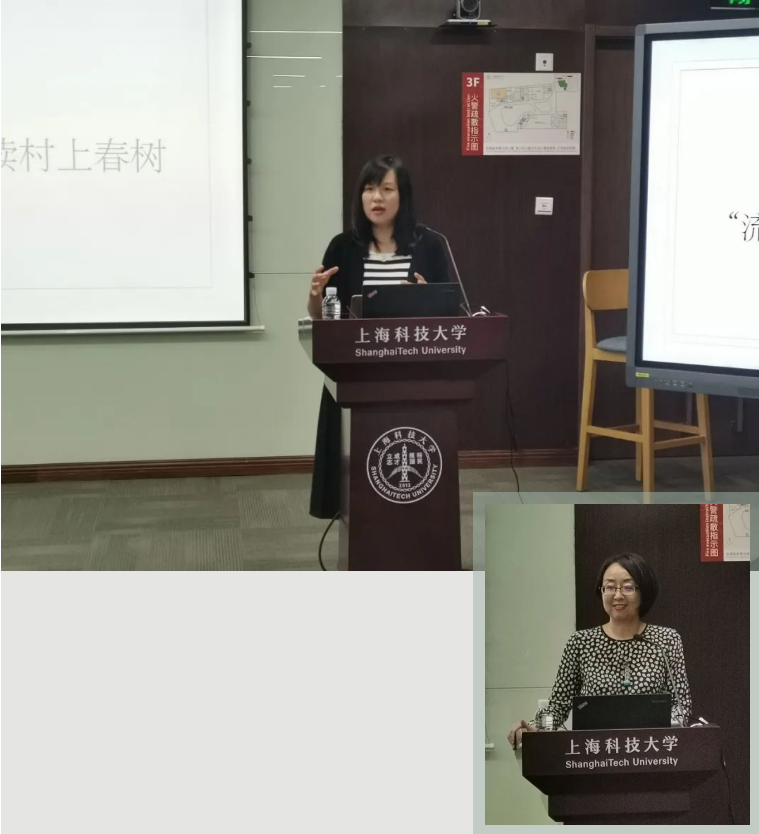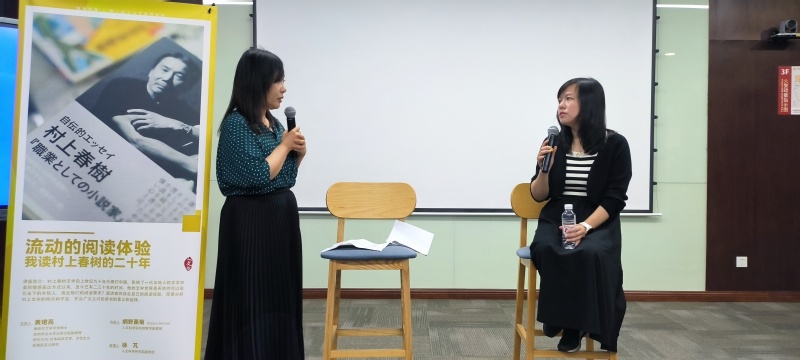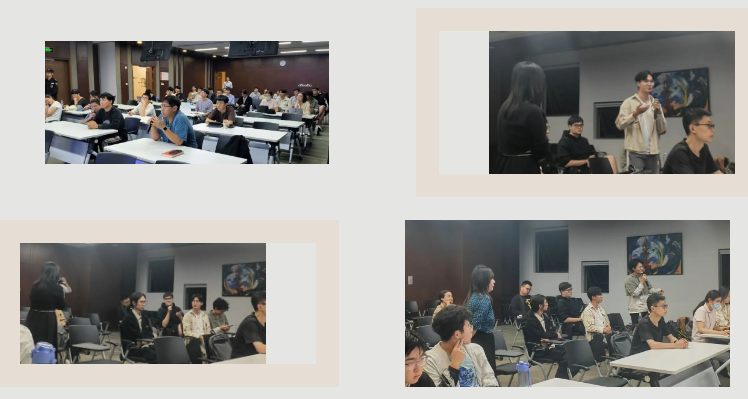
Professor Huang's lecture attracted dozens of spectators, mostly ShanghaiTech’s students. She begins by looking back at Murakami's influence in China during his college years. Murakami is a new wave of Chinese literature that began with his novel Norwegian Wood, the first of his novels to be translated into Chinese (it was published in 1989 by the Li River Press and quickly sold out in several printings). Since then, many of his works have been introduced one after another, and some have even appeared in different Chinese translations, winning a large number of young readers in China in a short time. However, Professor Huang changed his speech and entered the topic of the lecture that night, saying: Murakami Literature and I have long parted ways, from the earliest addiction, to the doubts in the middle period, and then to the current criticism, I feel that with the accumulation of my academic training and life experience, now his novels seem to have been unable to meet my expectations of literature . But I believe that reviewing this process of gradual qualitative change can help us think about our methods and choices of reading.

Professor Huang's lecture attracted dozens of spectators, mostly ShanghaiTech’s students. She begins by looking back at Murakami's influence in China during his college years. Murakami is a new wave of Chinese literature that began with his novel Norwegian Wood, the first of his novels to be translated into Chinese (it was published in 1989 by the Li River Press and quickly sold out in several printings). Since then, many of his works have been introduced one after another, and some have even appeared in different Chinese translations, winning a large number of young readers in China in a short time. However, Professor Huang changed his speech and entered the topic of the lecture that night, saying: Murakami Literature and I have long parted ways, from the earliest addiction, to the doubts in the middle period, and then to the current criticism, I feel that with the accumulation of my academic training and life experience, now his novels seem to have been unable to meet my expectations of literature . But I believe that reviewing this process of gradual qualitative change can help us think about our methods and choices of reading.
Taking Murakami's best-known work, Norwegian Wood, as an example, Professor Huang goes into great detail. Why a plot is not twists and turns and no profound meaning of the novel, there is such charm. She describes several characteristics that Murakami Literature researchers agree on. First, the realism of the work - the realistic style of the subject matter (even if it is hidden behind an unrealistic fictional description); The atmosphere of The Times (in the 1980s, Japanese youth, especially urban single youth, tilted the spiritual world of weightlessness - Murakami himself was an only child). Secondly, Murakami's works can be found in a large number of fresh and elegant, humorous metaphors, these metaphors are very sharp, can accurately convey the author's meaning. For example, the image of the bear in spring is used to compare girls, and the image in this metaphor is not only the bear with fluffy and bulging eyes, but also the time of the bear's appearance, that is, spring, and the place where it appears, th2at is, the field. It represents a lack and a desire, a sensibility that is both excited and uneasy, and a bit of well-controlled wildness, which is very subtle and accurate in describing the fresh and tentative feelings of the hero for the bold and straightforward girl named Green Son who hates the color green most. Murakami's metaphors, both unexpected, thoughtful and understandable, are, as Lin Shaohua, the Chinese translator, describes them, a contrarian attempt to connect things that are basically unrelated. This is one of the features of his literary language or style that most appeals to young readers. No one would disagree that Haruki Murakami has created a novel form of Japanese literature.
In addition, Murakami's language is also characterized by his great attention to details and specific numbers. For place names, song titles, book titles, personal names, various units of measurement and time, even the size of the movement, the length of hair, the color of clothes, the composition of food, and so on, he is extremely obsessed with accurate description. For example,
I put the letter in an envelope, stamped it, and sat at my desk staring at it for a long time. It was a much shorter letter than usual, but I thought it would convey my feelings better. I poured 3cm of whiskey into a glass, drank it in two sips, and then fell asleep. (Norwegian Wood, p. 276)
僕は手紙を封筒に入れて切手を貼り、机の前に座ってしばらくそれをじっと眺めていた。いつもよりはずっと短い手紙だったが、なんとなくその方が相手に意がうまく伝わるだろうという気がした。僕はグラスに三センチくらいウィスキーを注ぎ、それをふた口で飲んでから眠った。(『ノルウェイの森(下)』192ページ)
This kind of detail description is full of realism, but because it is too specific, it has a sense of absurdity, because the general literature will not record such details one by one.
In the second part of his lecture, Professor Huang analyzed the relationship between Murakami's language characteristics and his reading. It fits in well with the theme of Reading of this humanities festival. Murakami has been a bookworm since childhood, she said, and so have almost all of his protagonists, read, listen to jazz, drink whiskey, entertain cats and date girls. The books he reads, like the music he likes to listen to, are mostly foreign. According to Mr. Lin Shaohua, the Chinese translator of Murakami, Murakami did not read Japanese literature when he was a child, he liked to read the complete works of world literature, multi-volume world history, biographies, diaries and other non-fiction works, Western novels of the 19th century, polyphonic novels, etc., but also loved to read detective novels, including Conan Doyle and Sherlock Holmes. In 2021, life magazine BRUTUS released a Murakami special issue, including a personal Murakami book list introduction, he recommended 51 books,in which the works of Japanese authors takes only a small number/with a small ratio of works by Japanese authors. In the foreword to the special, he writes about reading: Books are good things that flow incessantly between those who want to read them, but they are useless if they are stored in the corners of bookshelves. Recalling his own reading history, he said, I was addicted to reading in my teens. Even if there is nothing, but feel that as long as can read is happy. I bought a lot of books and read books from the library. Most of the books I read are novels. ... What played a role in the beginning of writing the novel, and what continues to play a role in the future, is the memory of various books that have been acquired through indulging in reading so far. It is like a great deep reservoir from which I can draw water for my own use according to my own needs. If such accumulation did not exist, it would not be able to write continuously as it is now. Come to think of it this way, I've never had a moment of trouble or struggle writing a novel so far. If you want something, if something is not enough, you can draw the water you need from the reservoir. What really matters is not the things, but the memories that permeate the body. This is what I want from my heart. Someone once said inspiration is memory.
Murakami says his English skills are limited and he didn't do particularly well in English at school, but he enjoys reading novels in their original language (as evidenced by his list of 51 recommended books) and makes an effort to write in English. In this way, this enables him to find a new way, to omit superfluous words and concise intentions in the description, to transform the language itself, and gradually explore his unique writing rhythm and create a new style of his own. My goal, he says, is to eliminate superfluous embellishments and write in a 'neutral' and movable style. I do not want to write articles in Japanese with a weak Japanese flavor. Instead, I want to say novels in my own natural voice, far from the language of fiction and the system of pure literature. It can be said that the extensive reading of English novels from childhood played a decisive role in creating his own style of Japanese fiction, and Murakami did not set out to become a novelist.
Professor Huang took this as an opportunity to guide college students not to take reading as a utilitarian thing, but as a reservoir, as said by Murakami, first filled with various memories of reading, so that the body can digest it and become part of their own, and one day when they take it out, they can take out things with their own body marks, rather than copying the language of others. Even if our goal is not to become a novelist, reading can develop a person's aesthetic, and aesthetic also becomes a part of our body, which determines the path we take, the people we like, and the choices we make.
She continued: I think one of the things that reading does is to create some distance from reality, to maintain a state of solitude. As Ai Maeda pointed out, the development and popularization of modern printing technology has completely changed the way modern readers read. In the past, there were few printed books and they could only be copied by hand. After copying, everyone gathered together to listen to a literate person read aloud. But for modern readers, reading has become a private, private activity, in the lonely state, the individual completes the communication with the author. In Murakami's work, this sense of distance is deliberately created everywhere between the characters, between the reader and the author.
The third part of Professor Huang's lecture focused on her cognitive changes in Murakami's literature. In some works, she criticizes, when Murakami inserts controversial plots or characters and then lets them die out without doing anything about it, she feels a certain invalidity to the power of his literature. Murakami is good at describing the trivial and ordinary of everyday life (especially dialogue) in a bland, distant and humorous tone, but he is not good at dealing with the intense conflict of drama.
In addition, many female characters in Murakami's novels are free to come and go, not conventional, and are full of fans. Maybe mystery can be sexy, but this vanishing ending is simply because the author doesn't want to be responsible for it. After reading Haruki Murakami's new works 20 years later, on the one hand, I admire his decades of unremitting diligence and his attempts in various literary types (in addition to novels, Murakami has also published interview collections, essay collections, essays, translations, picture books, etc.); On the other hand, why does the growth of the hero in Murakami's literature always depend on the absorption and transcendence of others?

Professor Huang's lecture ended with a question about Murakami. By doing so, she encouraged her students to read critically. She said, Perhaps the cultivation of critical spirit is another purpose of reading, reading is not to accept the values of any author, but to develop their own values in a fluid process of thinking. Just like one day I went to the bookstore and saw a sign that said, there is no beauty like a jade in the book, there is no golden house in the book, but there must be a better self in the book.

